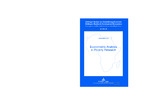Econometric Analysis in Poverty Research
With Case Studies from Developing Countries
Abstract
Poverty and inequality persist in many regions of the developing world. This may be due mainly to an ineffective targeting of policies to address the root causes of poverty. Sustainable policy interventions are in need of reliable concepts of poverty and of a thorough understanding of the underlying mechanism that lead to such deprivation. The three essays of this book add to the debate concerning appropriate statistical tools in empirical development economics. The work proposes specific methodologies to analyze the extent of poverty and its underlying factors based on recent household surveys. The first chapter deals with a concept of poverty comparisons when panel data is at hand. The second chapter studies the determinants of spatial inequality using multilevel modelling. The third chapter analyzes the relation between a child’s nutritional status and its survival probability.
Keywords
Analysis; Armutsmessung; Case; Countries; Developing; Econometric; from; Gräb; Kindersterblichkeit; Ökonometrie; Poverty; Regionale Ungleichheit; Research; Studies; Unterernährung; WithDOI
10.3726/978-3-653-00480-9ISBN
9783653004809OCN
1082958588Publisher website
https://www.peterlang.com/Publication date and place
Bern, 2011-06-15Series
Goettinger Studien zur Entwicklungsoekonomik / Goettingen Studies in Development Economics, 26Classification
Sociology and anthropology
Political science and theory
Monetary economics
Development economics and emerging economies


 Download
Download